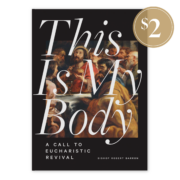This piece first appeared in the Autumn 2019 “Creativity” issue of Evangelization & Culture, the quarterly journal of the Word on Fire Institute. You can learn more and become an Institute member today to read more pieces like this.
She is one of the greatest, and most original, of American fiction writers. But if you have never read Flannery O’Connor and are looking for a good place to begin, you might want to forego diving directly into her short stories (and especially her two novels) until you have made a more personal acquaintance with this striking, often challengingly gritty Catholic storyteller. If you are looking for pious narratives of devout Catholic characters and hopeful, heartwarming Hallmark Channel resolutions, you will not find them in her fiction.
Flannery O’Connor was very clear about her artist’s mission: “My audience are the people who think God is dead. At least these are the people I am conscious of writing for.” Hence, her fiction is dark, violent, strange, grotesque, often comical, and always artistically brilliant, but a reader has to be ready for it.
The best place to begin a study of Flannery O’Connor, as a person and an artist, is with her nonfiction, particularly her letters as compiled in The Habit of Being. The collection, written between 1948 and 1964, was introduced and edited by Flannery’s dear friend Sally Fitzgerald, and it is a treasure of faith-filled yet pragmatic insights on the nature of human sin and supernatural graces.
It is within The Habit of Being, from a letter dated May 8, 1955, that O’Connor famously quips, “Everybody who has read Wise Blood thinks I’m a hillbilly nihilist, whereas I would like to create the impression over the television that I’m a hillbilly Thomist.” Her rejection of nihilism (and her acceptance of and fidelity to Thomism) are essential to understanding O’Connor and her art.

It is unfortunate that today the words “Thomist” or “Thomism” are often associated with an outdated, boxed-in, scholastic tradition that fails to engage the modern world. But such an understanding is contrary to the true spirit of Thomism and Thomas Aquinas himself, and it has nothing to do with how O’Connor understood him. For her, St. Thomas Aquinas was a brilliant philosopher, an unrivaled theologian, and an exemplary researcher and teacher. He taught that God exists, that it is reasonable to believe in him, and that the world was created and redeemed by him, all of which are antithetical to nihilism. Although O’Connor admitted that “Thomism usually comes in a hideous wrapper,” she shared these beliefs with the thirteenth-century Dominican friar and never once apologized for being Catholic. She was constantly reminding her friends, “I write the way I do because (not though) I am a Catholic,” and “I have never had the sense that being a Catholic is a limit to the freedom of the writer, but just the reverse.”
Thomas’ metaphysical realism had a profound influence on O’Connor’s religious and artistic imagination, which assisted the development of her prophetic, incarnational, and sacramental vision. The “hillbilly” part of O’Connor’s Thomism rests simply on the fact that she spent the last fourteen years of her life living with her mother, Regina, on a working dairy farm four miles outside of Milledgeville, Georgia, and because her stories were mostly set in the rural South.
“If you feel you can’t believe, at least do this: keep an open mind. Keep it open toward faith, keep wanting it, keep asking for it, and leave the rest to God.”
Her letters reveal another quality that O’Connor shares with St. Thomas: an appreciation for brilliant company. When you read Aquinas, you are introduced to the writings of Plato, Aristotle, Augustine, Boethius, and other great minds. With Flannery, you find yourself falling in with an impressive intellectual community. Although O’Connor once wrote, “I’m not an intellectual and have a horror of making an idiot of myself with abstract statements and theories,” the truth is she was exceptionally bright, highly regarded in academic circles, and a correspondent with some of the sharpest minds of her day, including fellow writers and artists, university professors, and some very well-educated friends. It is within her exchanges with these individuals that she shares her thoughts on authors whose books she was reviewing for her diocesan newspaper—writers like Bloy, Bernanos, Mauriac, Gilson, Maritain, Marcel, Picard, and Guardini, to name a few. In a brilliant letter to Alfred Corn, dated May 30, 1962, O’Connor wrote, “To find out about faith, you have to go to the people who have it and you have to go to the most intelligent ones if you are going to stand up intellectually to agnostics and the general run of pagans that you are going to find in the majority of people around you.” This explains the constant referencing of books by writers like Augustine, Aquinas, John of the Cross, Catherine of Siena, Edith Stein, Simone Weil, J.F. Powers, Walker Percy, and Pierre Teilhard de Chardin throughout her letters.
Flannery O’Connor’s work is very unlike Aquinas and the scholastic tradition in general, in that her writing is very personal. And since her letters are letters, and not disputed questions, one gains insight into her writing habits (“Just write every day whether you know what you’re doing or not”); her thoughts on chastity (“Anyone who thinks he’s pure is surely not”); her confidence (“I write because I write well”); her humility (“I am not a mystic and I do not lead a holy life”); and finally, her humor (“When in Rome, do as you done in Milledgeville”). In this way, O’Connor is more Augustinian than Thomistic in style, as she shares her life, her family, her friends, her joys, her fears, her sorrows, her hopes, and her very self with her reader. As you make your way through over six hundred pages of letters, you get the sense that she’s also writing to you—because she is. (O’Connor made carbon copies of all her letters for a reason.)
Depending on one ’s relationship to the Church, what readers of The Habit of Being tend to enjoy most, or least, is O’Connor’s unwavering devotion to her Catholic faith. Although she died a year before the Second Vatican Council concluded, she was already living her life as envisioned by the council—a lay Catholic woman, nourished by the sacraments and the rich intellectual tradition of the Church, intently focused on her artist’s mission to consecrate the modern world through her life and her work. She understood that writing was her vocation, and she took the call most seriously. She was earnest about liturgy, Scripture, philosophy, and theology, but highly suspicious of shallow piety. And although O’Connor had close friends who were clergy and religious, she could deliver some brutal criticisms of seminarians, priests, and nuns for their vapid presentations of the faith. To Cecil Dawkins, a fellow lay Catholic, O’Connor wrote, “It’s our business to try to change the external faults of the Church—the vulgarity, the lack of scholarship, the lack of intellectual honesty—wherever we find them and however we can.”

Flannery O’Connor went to great lengths to carefully explain Catholic dogma and doctrine to skeptics and nonbelievers, but she was exceptionally kind to those who struggled with their faith. In a letter to Louise Abbot, she explained, “What people don’t realize is how much religion costs. They think faith is a big electric blanket, when of course it is the cross. It is much harder to believe than not to believe. If you feel you can’t believe, at least do this: keep an open mind. Keep it open toward faith, keep wanting it, keep asking for it, and leave the rest to God.”
O’Connor’s letters are filled with this sort of excellent pastoral advice to those on the peripheries, and we are wise to pay attention and learn from her.
Flannery O’Connor was a realist who saw things as they were, but as a Catholic, her vision was ultimately one of hope. That being so, perhaps one of the most important reasons for Catholics to read (or reread) The Habit of Being is so that O’Connor’s singular vision can guide us as we navigate through the troubling realities of the present and work to form our future as a Church. Consider two of her most important and hopeful observations: “It’s in the nature of the Church to survive all crisis—in however battered a fashion”; “The Church is founded on Peter who denied Christ three times and couldn’t walk on the water by himself.” O’Connor loved her Catholic faith, but she wasn’t naïve about what it meant to be part of the Church. She once noted, “You have to suffer as much from the Church as for it”—and she was right. Yet Flannery O’Connor always remained a faithful daughter of the Catholic Church and a faithful hillbilly Thomist, which may be the exact brand of Thomism the world needs today.
